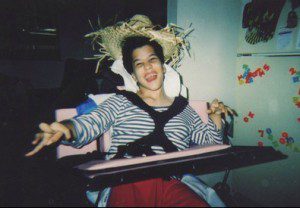 I just read a poleaxing story from the Tampa Bay Times that sheds light on what can happen when the state usurps the role of parents.
I just read a poleaxing story from the Tampa Bay Times that sheds light on what can happen when the state usurps the role of parents.
According to the Times, a severely disabled girl, Marie Freyre, was taken from her mother, Doris Freyre, at the wish of Florida medical professionals. The story is harrowing and shows that the Freyres were in a tough position prior to the state’s intervention. Doris could not care for her daughter herself and so requested funding from the state to give her in-home help. It was Doris’s wish to continue caring for Marie at home, as she had done for all her child’s life despite ill health on her own part.
You see this awful chronology unfold here:
From the beginning, state child protection administrators wanted to send Marie to a nursing home. Freyre’s attorney suggested such a move could kill her.
“With this type of child, when you institutionalize them,” attorney Steve Zucker said, “they never do well. And I’m very concerned.”
“Can the (state) do better than this?” he asked the judge.
At the end of the hearing, Corvo required child welfare administrators to do better. She wrote an order that Marie be returned to her mother, with additional nursing care through the night.
It was an order the state simply ignored.
Records show state child welfare workers disregarded Corvo’s order that Hillsborough Kids, which was under contract with the DCF, pay for the extra nursing hours while caseworkers looked into additional dollars from Medicaid.
Two weeks later, the state Attorney General’s Office and Hillsborough Kids appeared before a different judge, Emily Peacock. AHCA, which runs Medicaid, had refused again to pay for 24-hour care, a lawyer said. With no permanent solution in sight, the state said, a nursing home was the only option.
“The best placement for the child right now is a … nursing home where she can get that 24-hour supervision and care that she needs,” said Angeline Attila, an assistant attorney general.
Against Doris’s wishes, the state removed Marie from her home and put her in a facility. It appears that she was not cared for; official reports show that during a five-hour ride to Miami Gardens to the Florida Club Care Center, Marie received no food or water and had no access to her seizure drugs. This bone-chilling situation, however, only got worse.
Marie arrived in Miami Gardens the way she left Tampa: screaming. AHCA records for the next 12 hours mention only four notations in the nursing home file, and two of them document Marie “screaming.”
By 5:40 a.m. April 27, 2011, Marie was described as having “labored” breathing. Five minutes later, she was unresponsive. The AHCA investigation concluded she had been given none of her life-sustaining anti-seizure drugs, required three times each day.
Marie was pronounced dead at 6:54 a.m. Cause of death: heart attack.
Two days after being taken from her home, Marie was dead.
I don’t know about you, but this story rocked me. I have access only to the public reporting, of course. Furthermore, I have no doubt that various people involved genuinely wanted to help Marie. It would seem to be a mistake to paint everyone involved with a broad brush. Clearly, Marie and Doris faced tremendous odds even before the state’s intervention (which Doris herself sought).
But this report reads like a real-life horror story. It distills for me to a warning about how important it is that parents be able to care for their children as they see fit. Sometimes in life we face tremendous odds, and it is in such times that the government can be of assistance to us. People of varying political convictions are thankful that the state exists. When citizens are not able to lift themselves up, they have an authority to which to turn. That is a common-grace gift of God (see Romans 13:1-2; here’s an essay to ponder on this subject).
There is a twist in this story, though, that sends alarms off in my mind: the state judged it better for Marie to be out of her home than in it. It is that various professionals worked to take Marie away from Doris, who despite great obstacles wanted desperately to care for her daughter, as she had for more than a decade. It is heartrending to see the story progress in the article. You can see the mother suspecting that her daughter will suffer terribly; then you see that fear confirmed, as Marie’s “care” falls woefully short of that which her mother had given her.
Again, I am guessing that some in this debacle would not trace their motivation to a desire for the state to overtake the parent. But this takeaway emerges nonetheless in this awful tale. We witness the helplessness of a loving mother before the authorities. We see the family judged worse than the public institution. We see a daughter taken out of her home and placed in a facility. Statism is real. It has real consequences.
As I noted earlier, the state can and does care for people who otherwise would have no aid. There is a role for this kind of support, though I would personally want to note the tremendous importance of private charities and philanthropy in this kind of situation. With the viability of the state noted, though, I think that Christians read a story like this and see the limits of the state. The family is God’s original institution. It is the best place for children. Because of this, it is constantly under attack.
Statism is a real political philosophy, a competing theology in the intellectual marketplace. Alexander Solzhenitsyn waged an eloquent war against a form of it in the twentieth century, as did public figures like Whittaker Chambers. Many modern evangelicals have lapsed into apathy on this point, I think. We really do want the state to take care of us. But this is a dangerous bargain we make. Once the state begins to own rights given by God to the family, it will be hard to stop it. Encroachment of statism is not simply an issue for policy wonks to debate. Statism is a theology. It is a false one, asserting that the government can be our god, and its decrees our salvation. We must resist this philosophy, even as we champion the common-grace goodness of government as an institution regulating a fallen world.
We must also consider horror stories like that faced by Doris Freyre. We should remember Marie Freyre. And we should not sit on our hands, but should be stirred by Christian faith shaped by a self-sacrificial Messiah that cannot look away from injustice and cruelty, but must oppose it for the glory of God, and must work toward the flourishing of all God’s image-bearers.











